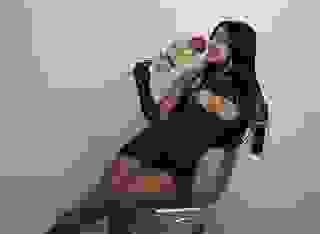- Romance
- Spring Green
- Page 3
Note: You can change font size, font face, and turn on dark mode by clicking the "A" icon tab in the Story Info Box.
You can temporarily switch back to a Classic Literotica® experience during our ongoing public Beta testing. Please consider leaving feedback on issues you experience or suggest improvements.
Click here"Her name is Madison."
"Madison Masterson?" I chuckled. "Isn't that a little over the top?"
He shook his head again. "Madison Addington. I adopted her some time ago. I've called her Maddie for years."
"That was thoughtful. Have you married, what's her name? Judy?"
I think he was about to cry just then, but I don't remember. Maybe I was. Then: "She passed away, oh, a few years before Ruth."
"I see. Who raised her, Chuck? Did you hire someone, uh, to take care of that, too?"
"Bill?"
"Yes, Chuck?"
"Fuck you, Bill."
I looked away. I'd never heard him so much as whisper anything remotely resembling that word in all my life, and anyway, having been locked away within the inner sanctums of the diplomatic world for a few years his was an unforgivable breech of etiquette. My feathers were ruffled.
But maybe I deserved it. Every bit of it. I had cornered the market on assholes that afternoon, of that much I was sure.
"Alright, Chuck," I said as I watched him, "what do you need me to do?"
He turned, looked at me with all the intensity an old lion can muster: "Cross the Atlantic. The three of us. I want the three of us to cross together."
My world grew fuzzy and dim and I wondered why, then I heard myself laughing, laughing so hard I almost fell overboard. But maybe I was crying a little, too. Hard to tell, in a moment like that.
Things got a little quiet after that. We had trouble pulling the anchor up from the deep muddy bottom, and even the jets roaring over as we motored past the airport seemed unnaturally quiet. I found myself holding my breath from time to time, and I think I even wondered why once or twice.
◊◊◊◊◊
We made our way to The Chart House for dinner, after we'd tucked the boat in for the evening; going there with Uncle Chuck had been a tradition for years, and it would be nice, I thought, to be on neutral ground. A safe harbor, you know, as in -- any port in a storm? He did his scotch and water thing, and I had my usual Mai-Tai, you know, one of those drinks with a little yellow umbrella sticking out the slab of pineapple. Well, I take that back; I had six of 'em -- in the first half hour. I was well on my way to a full blown diabetic coma when Chuck told the cocktail waitress I'd had my limit for the evening.
Oh! Did I mention Madison was going to join us for dinner? The cousin I'd not known about until about two-thirty that afternoon?
Had the trap been perfectly set, or what?
She was, he told me, 'somewhat-kinda-sorta' bright. She was at Harvard finishing up her BS in biology -- in three years, mind you -- and going to medical school at Columbia in the Fall -- at the age of 20 -- well, 21. He was understandably quite proud of the girl, this daughter of his. He loved her, and after spending a half hour with her I understood why. She was just about the nicest human being I'd ever met and, Chuck advised, she was one helluva sailor on top everything else. She was smart as hell, sure, but she was nimble and quick-witted as well. I saw she'd come prepared to do battle with me that evening, but visibly relaxed when she saw she'd only have to match wits with a quite well-toasted, patently blithering idiot. She came with her boyfriend, by the way -- whom Chuck quite naturally disapproved of. The hapless kid had majored in philosophy and wanted to go into the Peace Corps.
"Bad move, fella," I slurred, "better take up Mai-Tais before your light fades from the universe."
Yes, I was that charming.
But Chuck had already told Madison about his idea of slogging across the Atlantic -- together, the three of us. She was all for it, head over heels infatuated with the idea -- as a matter of fact. Yes, a nice little trap had been set. And I'd walked right into it.
"So when," I tried to say as I picked at the salad that had, somehow, quite mysteriously appeared on the table before me, "do you plan on embarking on this little adventure?" I'm not sure, but I think I was drooling on my lap by that point.
"That depends," Uncle said.
"On what, may I ask, does this jolly journey depend?" By the way, I talk funny when I'm inebriated, and it's one of the few things I learned from father. I've taken to it quite naturally, or so I've been told.
"You, William."
"Me? Moi?" I launched into a grand soliloquy in my very best French, no accent, about how they were quite foolish to make this enterprise contingent upon myself; of course Madison came back in her very best French, no accent, that I couldn't possibly be so selfish as to deny our beloved Chuck the chance to make this once in a lifetime crossing -- the chance to make his dream come true. 'True,' I said in defeat. She had marshaled her arguments, was ready for me. Poor me, she said; I had come to the battlefield unarmed. Who knew a grown man could be so stupid?
"Moi? Stupide? Allez et laissez-moi en paix!"
"Oui, stupide, et vous sentez mal, aussi!"
Chuck, scotch in hand, watched the two of us going at it with his nicest, most paternal smile just barely out of sight. I had just met someone as stubborn and obstinate as myself. A good sailor, too.
The Bastard! He knew she had me, too.
I never had a chance. Not a prayer, even.
+++++
Which is how, three weeks later, I found myself sitting at the chart table starting our plot as we set a northeasterly course off the northern tip of Cape Cod. And here I need to digress.
Most people who make an eastward crossing of the Atlantic in small sailboats do so by heading for Bermuda, there stopping for fuel and a brief sanity check, and then, once insanity has been confirmed, by heading on to the Azores, and perhaps on to Portugal or the English Channel. Assuming, of course, they make it to the Azores in the first place.
Then there is another group, another type of sailor. Let's call members of this group the 'well-and-truly crazy' crowd. Mad as a balloon does nicely, too. Fucked-up works, as well.
Those people whose insanity has never really been at issue, the 'well-and-truly-crazy' who walk among us, make their crossing by sailing along the western edge of the Gulf Stream, north and east past Nova Scotia, with an eye to skirting icebergs along a northern route that just misses Greenland and Iceland. Basically, the same track the Titanic took, only back-asswards. This route is cold, prone to sudden storms from both the north and south, and I'll not forget to remind you that in mid-May icebergs are still present in rather alarming numbers. By the way, this is the route that 'macho' sailors take, those that are racing or trying to beat some sort of record. Or, as mentioned, the plain crazy among us.
Cruisers in small sailboats just don't take this route unless they absolutely, positively need to. As we weren't at the moment fleeing religious persecution I thought it safe to mention to Chuck that this necessity was in the instant case notably absent, that any decision to take the northern route was flawed, dangerous even.
I think my first hint that things were destined to be 'interesting' was when -- on hearing the word 'dangerous' -- Chuck and Madison smiled and nodded their heads vigorously.
C'est la vie. Il ya, mais pour la grace de Dieu je aller.
But the weather was glorious that first day. Even the first few days, as it turned out, and as I began to lay out our plot on chart after chart, the fresh sea air and abundant sunshine all too apparent, I had the audacity to think that our crossing might just be uneventful, and that we'd arrive in Ireland sometime in late-June with deep suntans and grand memories to share over pints of Guinness.
Like I said; C'est la vie. Je peux etre assez stupide.
◊◊◊◊◊
I think, looking back on it all, the third day out we should have taken stock of things and turned back. I would have, anyway, given the choice.
Sometime after sunrise Madison and I were in the cockpit, the windvane was steering and I was feeling pretty good about the world when we heard an ungodly booming-smashing sound and the boat lurched sideways off a wave. Chuck was up the hatch a nanosecond later; in time, anyway, to see the nice bright blue and very nearly submerged shipping container that we had just slammed into. This metal colossus had struck us a glancing blow and was now gurgling away in our wake, in seconds it disappeared completely from view. Our target had been one of those box-car size iron boxes they stack about ten-high on large "container ships"; while Madison and I shook in our sea-boots Chuck told us that every year thousands of these things get washed off ships and float around like land-mines for years, hitting ships and submarines and, occasionally, sinking small yachts.
Oh gee, what fun! If I'd only known!
And we were, I knew, lucky. Had we nailed the thing dead-on our bow -- instead of taking that glancing blow to the side -- we'd have, I think it safe to say, very probably gone down in less than a minute. The ocean felt very big those first few hours after impact, and the boat very small indeed. That the hull was deeply gouged and had not fractured was testimony that Uncle had indeed chosen the very best quality boat he could have; I remembered the grateful old builder quite fondly from that moment on -- and do to this day. 'You get what you pay for' had never been proven more aptly true.
For the next few days the weather remained fairly benign: cool and growing cooler by the hour, yes, but storms had so far passed well ahead of us, or developed so far behind that they posed no threat.
In the middle of my watch on our sixth afternoon I was alone in the cockpit, scanning the horizon for ships -- or, yes, shipping containers! -- when I saw our first iceberg. Humbling sight, really. I called out "Iceberg, Ho!" just like the lookouts on the Titanic, too. I assume the words had the appropriate effect, as Chuck and Maddie came dashing up, Nikons in hand and motor-drives firing away; then Uncle suggested we close on the berg and photograph the thing in earnest.
And so we did. Slowly, I might add, and carefully, too, the way one circles a rattlesnake on a cool morning, not sure of the chilled creature's striking distance. We came within a quarter mile of the berg, and it was huge, or so it felt, and the water around the base of it glowed with an ethereal silvery-blue-green sheen, radiantly so. Uncle decided to inflate the Zodiac and we lowered him away; he buzzed off and took photos of the boat next to the iceberg -- an image that still gives me the shivers to this day.
Yet within a few hours icebergs were no longer a novelty, and we altered our course south a little to clear the pack-ice that lined the northern route that year. An awe-inspiring sight, to see the moon rise over vast ranges of glowing mountains -- adrift below an infinite sea of stars.
And yet need I mention it got really cold after we hit the ice, and that with May poised to become June. And I'm not saying it was cool out, not even chilly -- it was cold, and interestingly enough I'd been living in equatorial Africa for quite a while. When the temp just barely made it up into the forties one afternoon I grew a little panicked; when I sat my watch that night, when it fell well below freezing under those same eternal stars, I became stoically resolved that death was imminent -- and I didn't give a shit.
Yet the experience was primal. It was immediately apparent to me that the boundary between atmosphere and space is immaterial; that we exist within this faint layer of gases between an unknowing earth and the vast infinity of our universe -- that had never been more obvious to me and I found the experience humbling. I felt small out there, yet never had my life felt more precious.
Maybe that's what Chuck had been searching for -- some sense of himself beyond the stony persona he'd cultivated all his life, some sense of place beyond the constructs of the 48th floor. I remember him out there under those stars bundled up in his bright yellow parka, and with a musty old wool beanie pulled down smartly over his ears, looking up at the sky -- the way a kid looks up at a Christmas tree. There was hope in his huddled form, hope that life went on somehow, but I think more than that, there was the simple aura of heartfelt gratitude blazing from his failing body.
+++++
Every voyage has its storm, just as each life comes face to face with events that define our strengths, and our weaknesses. Our voyage happened upon one doozy of a storm, but it found us well prepared and as ready as we could be emotionally. We had cleared Greenland and were in the gap between her vast mountains and Iceland, though both were still well north of our track, when a huge low-pressure system formed in the vast arctic north and barreled down on us. We had weatherfax on-board so had more than ample warning, yet sometimes warning induces more worry than is warranted. I can attest to that.
Gray clouds like mackerels' scales drifted down from the north the afternoon before the storm hit; there was a large halo around the sun just before it disappeared -- behind towering walls of storm cloud we saw charging down from the northwest. Seas built slowly with each increasing gust, and I waited -- and watched -- as each new fax came in. I plotted the center of the low on our chart, and I think I just managed to force a sense of control over myself, over my fear. The center of the low seemed to be tracking a little north of us and it soon looked as though we might escape being in the dangerous northeast quadrant of the storm, but as it always is, most things in life are relative. One man's ceiling is another man's floor and all that; what Chuck found exhilarating I found terrifying. While I was struggled to master my fear, Maddie became short-tempered and withdrawn. No one ate a damn thing for two days, yet I will never underestimate the nutritive powers of Gatorade ever again, though it tastes just as bad coming up as it does going down.
But whatever the nascent sense of control I'd fashioned from my efforts, it soon came undone as the center of the low approached. We were running before the storm under bare poles -- just the storm's momentum pushed us onward as we'd lowered all sail by that point -- but mercifully the seas didn't become unmanageable and the temperature actually increased into the fifties and (gasp!) sixties. Waves of maybe twenty, twenty five feet, winds in the forties with an occasional gust in the high fifties; not a hurricane certainly but enough to get your adrenaline going. Mine, anyway.
And yet, there was Chuck, tethered to the boat in his safety harness, smiling like the high school quarterback who'd just thrown that nifty touchdown pass in the fourth quarter to beat an old nemesis. He was in his element and happy as hell, happy to be alive and to be with two people he cherished. He never once felt like we were in any danger so I guess Maddie and I came to feel that way too. Chuck was the strength we tapped into, and his was a sustaining strength, a soul nourishing strength. If fear is contagious, so too can sustenance be found in a smile. Thank you, Chuck, wherever you are. Thank you for that smile.
◊◊◊◊◊
Waves towering, winds howling, then scattered, scudding clouds, gentle warmth in the air. Maddie down below making fresh bread and some kind of stew that tasted better than anything I'd ever had before -- or since. The bloody miracle of seeing a shadow! And what was that in the air? Earth? Tilled soil? Green hills on the horizon? I refined our position with fixes from all manner of bearings, and two days later we slip into the Irish Sea. Time ebbs slowly now, but soon the Isle of Man is ahead to port, Dublin not two days ahead. We could smell the Guinness from two hundred miles out and were intoxicated with the joy of our arrival.
◊◊◊◊◊
It turned out we made good time; I had tentatively planned to leave Chuck and Maddie in Ireland and make my way back to Africa via London but now the thought of leaving before making a final landfall in France seemed obscene. I called Washington. I twisted arms. I begged. I got two more weeks so had three to go before I had to be high-tailing it back to Africa. It would be just enough, we reasoned, so we 're-provisioned' and took to the sea together -- one more time.
And yes, that finality was something new in our air: this would be our last journey together. It was unspoken now, but we all knew it.
Chuck's plan was to take the boat up the Seine to Paris then wander the French canals for as long as he could. It was his life's ambition, he'd told me more than once, to while away his last days on a slow boat as he drifted between limestone cliffs and vineyards bursting with life. Not a bad way to go, I remember thinking at the time.
We had another 700 or so miles to fetch Le Havre, where the mast would be un-stepped and stored, so with time and a bit of luck permitting, I'd stay with Chuck and Maddie all the way to Paris.
But the Irish Sea is a harsh mistress. She often has other plans.
Cold currents funnel down this stretch from deep beneath arctic seas; they collide with a weakening Gulf Stream as she deposits the last of her vast energy into the English Channel and North Sea. Cold air masses arc down over arctic waters and slam into warmer masses that have crossed the Atlantic with the Stream; when collisions occur between these air masses the results can be stupendous. The Fastnet Race is held in these waters, and in 1979 such a storm formed with little notice. Of the 306 yachts that started the race more than 69 dropped out, 23 were lost or abandoned, fifteen souls were dead and gone when the reckoning was complete. Clearly the area is not chanced upon lightly; the prudent skipper keeps his eye on the weather. Like a hawk.
These thoughts weighed heavily on my mind as we motored between Land's End and The Isles of Scilly on a mirror flat sea; it was so calm and hot on this last leg of the journey that I'd have cheerfully gone naked had Maddie not been aboard. The deck broiled the bottoms of our feet and the refrigerator chose this most opportune time to give up the ghost. No storms threatened, the only thing standing in our way during this last passage was the heavy shipping that floods in and out of the Channel day and night, and while one does not cross this shipping lane without due care, radar reduces the stress of the exercise to modest levels.
So we made Le Havre with sunburned shoulders and blistered feet; checked into a decent hotel while the mast was removed and the balky fridge fixed, then after a few days standing under cool showers, we motored up the Seine. Calm this stretch of river is not; it comprises industrial wastelands punctuated by idyllic scenes of pastoral beauty, all underscored by heavy commercial barge traffic that roars by in a never-ending parade -- yet the river was enchanting. I could see why Chuck wanted to experience this ancient beauty for himself, and make this a parting gift to us -- and to not keep the magic to himself.
We made Paris in a couple of days and found moorage in the marina by the Bastille, then in a remarkable act of symmetry we took rooms at the Crillon -- where my parents went for tea and Pernod the day they met. We spent a few days together wandering Paris; neither Maddie nor Chuck had ever spent any real time in the city, and both were fascinated, as well as good students. We even managed to look over the shoulder of a rather talented young fellow painting hookers on the Boulevard de Clichy.
When I left a week later Maddie remained for a time, they spent the summer together wandering canals and following their noses, I'm sure, to each new bakery, into each new alluring vineyard.
I remember turning and looking at him as I left; he was alone in the cockpit tinkering with a disassembled winch when he looked up and saw me watching. He smiled, gave me a little salute and smiled that gentle smile of his, and waved before I turned away.








